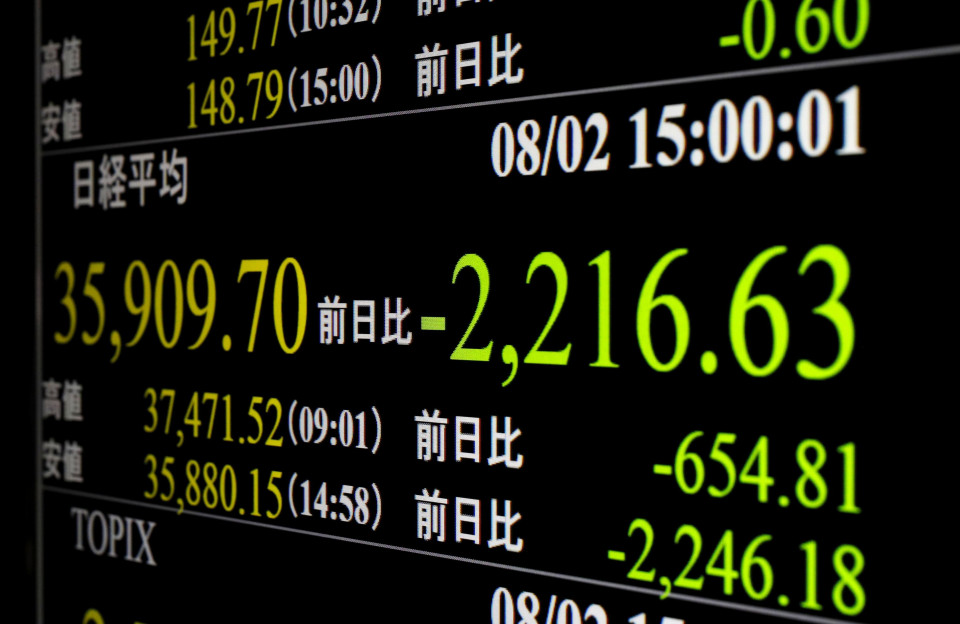The Nikkei stock index tumbled over 2,000 points Friday to register its second-largest point drop in history, in a global market rout stirred by concerns over a U.S. recession following weaker-than-expected economic data.
Stocks were sold across the board following the previous day's plunge as sentiment further worsened, with a recent appreciation of the yen against the U.S. dollar also spurring selling of export-related auto and electronics issues.
The 225-issue Nikkei Stock Average ended down 2,216.63 points, or 5.81 percent, from Thursday at 35,909.70, its lowest closing since Jan. 26. The broader Topix index fell 166.09 points, or 6.14 percent, to 2,537.60, its lowest closing since Feb. 1
Every industry category on the top-tier Prime Market lost ground, led by securities house, insurance and bank issues.
Shares continued to tumble as a risk-off mood prevailed following disappointing weekly jobless claims and manufacturing data in the world's largest economy, sending U.S. and other stocks sharply lower.
Friday's plummet on the Nikkei was the second largest single-day drop on record since Oct. 20, 1987, when the benchmark plunged 3,836 points the day after the Black Monday stock market crash.
The dollar remained under pressure and fell to the upper 148 yen level, as the yen was sought after the Bank of Japan on Wednesday raised interest rates and BOJ chief Kazuo Ueda did not rule out the possibility of further hikes later this year.
At 5 p.m., the dollar fetched 149.20-23 yen compared with 149.36-46 yen in New York and 149.85-87 yen in Tokyo at 5 p.m. Thursday.
The euro was quoted at $1.0804-0805 and 161.21-25 yen against $1.0786-0796 and 161.23-33 yen in New York and $1.0801-0802 and 161.86-90 yen in Tokyo late Thursday afternoon.

The yield on the benchmark 10-year Japanese government bond fell 0.075 percentage point from Thursday's close to 0.955 percent, the lowest since late June, as investors bought the safe-haven asset amid tumbling Tokyo stocks.
Stocks have fallen globally on concerns over weak U.S. jobs data set for release later Friday and that the Federal Reserve, which many believe will start reducing interest rates in September, may be too late to support the economy, said Seiichi Suzuki, chief equity market analyst at Tokai Tokyo Intelligence Laboratory Co.
"There was a talk of additional rate hikes in Japan when fears were heightening over a U.S. recession," leading to steeper stock declines in Tokyo compared to other markets, Suzuki said.
The Tokyo stock market had been climbing recently, with the Nikkei index ending above the 42,000 mark for the first time on July 11, amid optimism over the earnings of Japanese firms on the back of a weak yen and expectations of a soft landing of the U.S. economy.
Following the recent sell-offs, brokers said that there have been short-term oversold signals for the Nikkei, and they expect dip-buying to step in next week.
"Even if the U.S. employment data turn out to be weaker than expected, investors may have already priced in the outcome," Suzuki said, "Such an outcome could raise expectations for (more) rate cuts this year by the Fed and boost the market."
Related coverage:
Tokyo stocks tumble as stronger yen dampens earnings prospects
Yen jumps to 149 zone vs dollar after BOJ rate hike, governor remarks
Nikkei logs biggest point fall in 8 yrs on tech sell-offs, firmer yen











